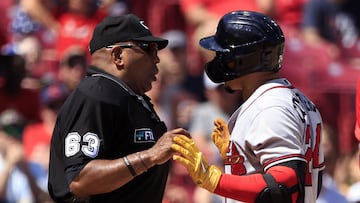Will robot umpires be used in MLB?
MLB has inched closer to rolling out the Automatic Ball-Strike system, known as robot umpires, and is trialling it in Triple-A ball ahead of its 2024 appearance in the Show


Everyone who loves baseball, loves it for similar reasons. Tradition and pace, a game not bound by time, and barely by space, harks to a simpler time and life. Calls for the game to speed up and become more rigidly governed are loudest from the corporate investors, and the owners who wring their hands, and wallets, every season.
When asked about his favorite game, the legendary boxing writer Jimmy Cannon pointed to baseball. “It is the best of all games for me. It frequently escapes from the pattern of sport and assumes the form of a virile ballet. It is purer than any dance because the actions of the players are not governed by music or crowded into a formula by a director. The movement is natural and unrehearsed and controlled only by the unexpected flight of the ball.”
2 Aug 54: Reading an article by the @nypost sports columnist Jimmy Cannon. Leiter commented "Good writer. Knows what he’s talking about" pic.twitter.com/LR0nmB7VpF
— James Bond (@JB_UnivEx) December 28, 2021
Likewise players, from those who struggled in high school to those who grace the halls of Cooperstown, have a bucolic view of the game, with Earl Weaver explaining it best. “You can’t sit on a lead and run a few plays into the line and just kill the clock. You’ve got to throw the ball over the damn plate and give the other man his chance. That’s why baseball is the greatest game of them all.”
Baseball, almost uniquely in the world of sport, is less about winning and losing than about the meaning of the game itself. It reminds you at once of everything that once mattered, everything that matters still, and like Proust’s madeleine, brings a lifetime of hope and joy and summer rushing to the consciousness.
Cries from the media that baseball is a game out of place in the modern world, a sport who will not survive the vanishing attention spans of the younger generations, are fugazi. Smoke and distraction. The death of baseball has been prophesied by the unwashed masses for nearly a century, as they struggle and contort the game into their own likeness.
Honus Wagner speaks pic.twitter.com/vns9Di4Qyi
— BaseballHistoryNut (@nut_history) July 3, 2022
And now, another step closer to their victory over our game has been taken. Major League Baseball has announced that pitch clocks will be used from next year. Clocks. In baseball. This is, of course, to speed up the rate of play, which was eternally slowed by the introduction of video reviews.
The city of London, in England, decided to create the office of the Mayor in the year 2000. Prior to that, the city was governed by several local boroughs, with no over-arching control or system. The first office holder was Ken Livingstone. In the run up to the elections, Livingstone promised to tackle London’s traffic, and he decided to do this by creating a city-wide network of automated license plate recognition cameras to issue fines to anyone who had driven in the city without paying a “congestion charge” tax.
To give the illusion that this system had a wonderful effect, Livingstone and his cronies in City Hall tampered with the red lights, scheduled massive construction works throughout the city, and generally did everything possible to grind traffic to a halt for the six months preceding the rollout date. Then, magically, on D-Day, all of the traffic lights were re-timed and all construction disappeared. Traffic ran smoothly, and everyone hailed the great triumph of congestion charging.
Here is the thing, though: the traffic after the congestion charge was exactly the same as it had been before Livingstone’s election. He made it worse so that it could appear better. Baseball has done the same thing with clocks.
Ken Livingstone book published 35 years ago pic.twitter.com/phfTwX5TxB
— Stephen Gaastra (@sgaastra) June 30, 2022
Baseball will now also have an automated ball and strike system, gleefully referred to by the press as “robot umpires”, from 2024. Umpires have gotten calls wrong for two centuries. They have gotten most calls right, though. They are no worse than they have ever been, and in fact, are more educated in the rules of the game and generally of the highest caliber of any umpiring crew to ever grace the game. And yes, that includes Angel Hernandez. You may not like his strike zone, but it is a consistent strike zone.
The concept of the ABS is straightforward enough. Cameras at the top of the stands will recognize the height of the batter and work out where the top and bottom of the strike zone should be. Left and right will be pre-set by the width of the plate and when a ball is pitched, the system will dictate to an earpiece in the umpire’s ear whether to call a ball or a strike.
This is coming, folks. That’s the nature of technology; if it’s available it will be used. // Robot umpire works Atlantic League All-Star Game - The Washington Post https://t.co/WhXz73GPtb
— T.J. Quinn (@TJQuinnESPN) July 11, 2019
As anyone who has ever owned any technological device ever, from a digital calculator to a Apple watch, can testify, it is wonderful when it works. And when it doesn’t, which is far more often than the manufacturer will ever admit to, you just leave the clock on the front blinking because there is no way to get it fixed.
As with Ken Livingstone, this is yet another example where the problem is ramped up to make the solution look grander than it really is. For a number of years, there is a concerted onslaught in the media and commentary, more often than not by people who never played beyond little league, about the “bad” umpiring.
"Gonna be one of those nights"
— Jomboy Media (@JomboyMedia) July 1, 2022
Christian Yelich was not happy that Angel Hernandez didn't go to the 3rd base ump on a close checked swing call pic.twitter.com/6pLZKb3cvD
A perfect example is the 2019 World Series, Game 6, where Trea Turner ran inside the base path and interfered with the throw to first. That was a classic, textbook example of the runner’s lane rule, and he was duly called out. A perfect call in an indisputable example of interference that generated weeks of press about the “terrible” “controversial” decision. It was neither one nor the other, and the people who called it that were either ignorant of baseball, or more likely, had a vested interest in undermining the umpire’s authority.
Ramp that up by a couple of years and we now have weekly, sometimes daily, articles, tv talk shows, and podcasts, devoted almost in their entirety to turning the tide of public opinion away from the umpires and toward an automated system.
This is not to say that all involved have something to gain from an automated system, many are simply caught up in the “well this story sells so I’ll write more about that” mentality.
Baseball Birthday
— St. Abner (@Saint_Abner) July 1, 2022
George H. "Foghorn" Bradley
Born today in 1855 in Medford, MA
Player
Boston Red Caps (#Braves)
Umpire
National Association
American Association
National League
Bradley was the lone umpire for the first perfect game in MLB history. pic.twitter.com/YGWBEQ5dju
Back in May, MLB launched the ABS system in the Pacific Coast League of Triple-A ball. It is now only one step away from the Show. Baseball insiders have confirmed that, barring any significant difficulties with the system, it will be used in the big leagues from 2024.
It is early days yet, and with more time in use things can certainly change, but so far the data does not indicate that this system improves the accuracy achieved by your good, old-fashioned, guy-with-an-eye-for-balls-and-strikes umpire.
Rayvon Fouché, professor of American Studies at Purdue University, has researched technology in sports, and comes to the same conclusion. “At the core, sport is a human endeavor, and we like to cheer for our fans. We like to vilify the umpires. It’s a theater of sport and part of that would be lost if we moved to robotic officiating.”
MLB umpire rips Will Middlebrooks for criticizing umpires: You didn't live up to 'superstar' hypehttps://t.co/LVys9yQTpT
— 105.3 The FAN (@1053thefan) June 30, 2022
When the Star Trek film franchise was “saved” by JJ Abrams, it was done so by effectively turning Star Trek into Star Wars. Those who never liked Star Trek thought it was great, the only Star Trek film that they really enjoyed, while die-hard trekkies thought it was a blasphemy, a destruction of everything that they held dear. Baseball is flirting with just such an outcome, modifying the game to suit the taste of NFL and NBA fans, ignoring their own faithful in search of a bigger bottom line.
Related stories
Perhaps, in looking for perfection in officiating, we should consider baseball itself, and the lessons that it teaches us. That perfection is unattainable. That effort exceeds outcome. That life is sometimes unfair. There is a reason that we elevate the perfect game to such heights. How mundane, how pedestrian, for it to become commonplace. To witness one in a lifetime is more than one can ask for.
As we tinker with the beautiful game, we risk losing all that makes it dear to us. Please don’t do that. Leave baseball intact for your grandchildren to enjoy. Take your time and enjoy the summer. Maybe you can create memories that will long outlast you, and isn’t that what baseball is really all about?

